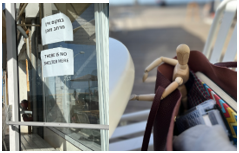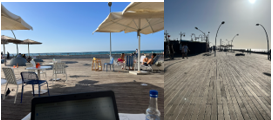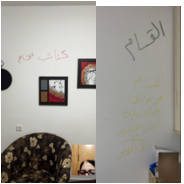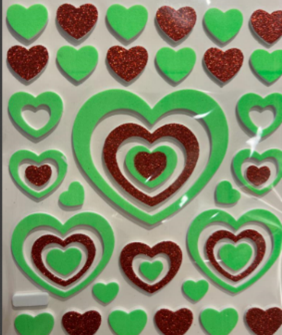Written from Tel Aviv Port
There is no shelter here, reads the sign blowing in the wind taped to the glass door. I have walked from one end of the namal (port) to the other looking for a cafe, not a restaurant that serves fish or chicken. I want a salad and a hot coffee with oat milk. I have found one at the northern area of the port of Tel Aviv. Not fancy but with a table near an outlet and they serve coffee. I take a small pasta salad with feta cheese out of the cooler and buy it with the coffee. I have brought Eitan to meet Eli and will stay the day to write and draw. I have found a little wooden figure to use for my last drawing lesson.

I map out my plan if there is a siren. I will run away from the cafe, towards the water and lie flat on the ground. My pilot friend tells me the closer to the ground, you are the less of a chance there is of being hit by shrapnel. I will try to get far away from possible glass shards.
The boardwalk is full (even though my pictures do not show it), the cafe is full. A couple with a white fluffy dog spoon-feeds her dog something chocolate. There are three middle-aged ladies discussing the war next to me. In French. I sit at a small round metal table with the sea in front of me. A sailboat in the distance.

If there was no news or social media, it would be hard to tell there is a war going on 70 kilometers away from where I sit. Serious military fighting between IDF soldiers and Hamas is going on less than an hour’s drive away. Our men and women, boys and girls are fighting for our lives. And I sit in a cafe and look out at the sea watching pigeons peck at crumbs while I type.
We are now a month into the war. Almost one month from the horrific day of October 7. The day that history changed or at least Jewish history and Middle Eastern history. The day that nearly every Israeli and possibly every Jew is no more than two degrees removed from some horror. Still no word about Hersh.
I have times when I cannot let myself think too much about where the hostages are. Possibly underground? Possibly without natural sunlight? Are they bound? Are they in pain? Are the children allowed to play? Are they scared all the time because bombs are being dropped all around them? Do they have hope that we are coming for them? These thoughts constantly mess with my mind about how they can possibly be found or rescued. I cannot see an answer.
Humanity. The lack of humanity, the conflict of humanity. How to care for humanity in this impossible situation. The pictures of Gaza that have been broadcast make me shudder. I know we (the Israeli nation) must do everything to destroy Hamas, but the cost to the civilians is crushing.
I see a father carry his young daughter to a hospital and lay her on a gurney. He carefully wipes the dirt off her face as the doctor confirms she is dead. His wife and other kids are lost in the rubble. He sobs quietly, not in loud anguish but quietly. Something about this scene breaks me. Tears stream out of my eyes. My heart is broken for every man, woman, and child whose lives have been changed forever – on every side. Everyone is losing something, or someone – some have lost whole families. Can you imagine? Really imagine that? I cannot.
There is too much fear and sadness and lives ruined here and there and Hamas, Hamas is, without a doubt in my mind, fully and completely responsible. I am very angry, angry, angry and heartbroken.
The cafe is closing, and I ask the French lady if she will watch my computer while I get myself another coffee and use the bathroom before they lock the doors. The woman at the counter wears a hijab. I feel more than I ever have that we must find a way to live together once Hamas is gone. If there were no fanatics (on both sides), and we could just find a way to live together, I think we must. Two Apache helicopters fly overhead above the sea heading south.
Shabbat dinner is with Rhonda and Jay and Caryn, her sons Divi and Eitan. Caryn tells of her Kibbutz family’s tragedy. A cousin went fishing with his son in Zikim, next to the border of Gaza on that fateful Saturday. They noticed a number of terrorists and called the police. The operator could not make sense of what he was saying and apparently did nothing to help. They are no longer with us.
Today in Jerusalem she witnessed a soldier in street clothes carrying his M16, walking with his wife and two kids. A lady rolled down her window and handed the man chocolate. The kids asked their dad, why did they give you chocolate? Because I am a soldier, he told his kids. No other explanation.
I will head home now. There are still sandwiches to be made for the week and laundry to do. On the way I will stop to drop off a thin envelope given to me at the Dan Panorama Hotel where a friend/colleague is staying. She was a resident of Kfar Aza, one of the settlements that was terrorized.
Ronit and I WhatsApp to find each other and I see a lovely 60-something lady with black glasses and a big smile. We hug. She has been evacuated to the hotel and will live there with other “refugees” for the next six months until more is clear. She recounts to me her story. Seems she needs to share, and I want to listen. She had invited her family to join her at the kibbutz for Simchat Torah, but her daughter did not feel well. She and her husband decided to go away for the weekend. They were not there on the tragic day.
She tells me about her neighbors who hid in their bomb shelter from 6:30 a.m. Saturday morning until 6 p.m. Sunday evening for nearly 36 hours. In the dark, without water, without food, without electricity and with a one and a half year old in complete silence while the terrorists went house to house.
She tells me they knew where every person lived, who was young, who was old, where the children were. They had absolutely everything mapped out. Twenty two from her community were killed; 18 are hostages. She cannot think about the future. She can only think of tomorrow. Some want to go back and to rebuild. Others do not. She is among the latter.
The terrorists destroyed homes and smashed belongings as part of their deed. Ripping furnishings apart, taking what they wanted to. Her home, she admits, was relatively untouched. Terrorists entered and spent the day there, she recounts. They had dragged hostages leaving trails of blood down the halls. They wrote on the walls in her living room in Arabic. She sends me the pictures and proceeds to tell me what it says in Hebrew, but I do not understand all the words – I am embarrassed to ask. I understand, nevertheless. The terrorists have signed their bloody work of hate. I literally feel sick to my stomach.

On the way back to the Hub, I pass a bus stop filled with people. I see at least six posters of hostages. I wish I had some heart stickers to put on them, I think to myself. Max, the dollar-like store, is right behind and I turn around to go find some heart stickers which I am sure they will have. I find some dull red ones. Nope, not happy and loving enough. I find some shiny ones that say “Be mine.” Nope. Then I see some puffy, red, sparkly and green neon ones. I buy three packages and decide I will now put them on every poster or flier I see. Maybe others will do it too.

I peel open the package and get it ready so when I meander through the crowd, I have my stickers ready. People are watching and I pull off my red sparkly heart and put it next to one of the hostages’ names. I look into his eyes, and I am sending him love. I hear someone say “Kol hakavod” (way to go), and stick on another: an older man, then a young woman. My own personal way of showing I have not forgotten them. One elderly lady asks for one and I stick it on her shopping cart.
The triage is over, the operation has started, and we are in the waiting room. There are moments of intensity and moments of simple regular life. Everyone is finding their way, how to be, how to give, how to cope. Some, maybe, better than others. One thing that’s true is the feeling of unity, and the love that is flowing here is real and, I believe, this is what will get us through.
